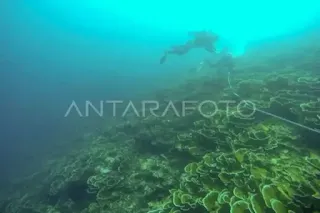Chairman of the Indonesian Coastal Youth and Student Association Hendra Wiguna said National Marine Day is an important momentum for stakeholders to evaluate the management of marine natural resources (SDA) wisely.
"This National Marine Day should be a momentum to evaluate how well we interact with the sea, and how we build superior human resources to be able to manage the sea wisely," said Hendra when contacted.
He said that Indonesia has enormous marine potential, both in terms of the area of the sea, its geographical location between two oceans and two continents, abundant natural resources, and megabiodiversity.
Hendra assessed that this potential could be managed well if human resources (HR) were also prepared thoroughly and sustainably.
"In managing or utilizing marine resources, we must uphold the values of sustainability as inherited from our ancestors," said Hendra.
"The principle of sustainability and benefit for shared prosperity is very important, so that marine resources can reach the next generation," he also said.
In addition, he assessed that stakeholders need to reorganize Indonesia's marine economy by prioritizing sustainable values.
Therefore, Hendra highlighted the Supreme Court's (MA) decision regarding the ban on sea sand exports as good news, as was the revocation of mining permits in Raja Ampat.
Another problem is how to make the sea a shared way of life again.
Hendra said coastal communities generally have unique skills in managing marine resources, so it is necessary to build better distribution so that these products can be absorbed by the wider market.
"So what should be done regarding the many homeworks in the marine sector? First, restore the marine ecosystem. It would be better if this management was given to local community groups/ community based ," Hendra also said.
Furthermore, it is important for educational facilities to be in line with the potential of marine resources and the demands of the marine industry, such as strengthening socio-economic fisheries education.
"This is not limited to formal education, non-formal pathways can also be provided in coastal villages to coastal youth," he said.





